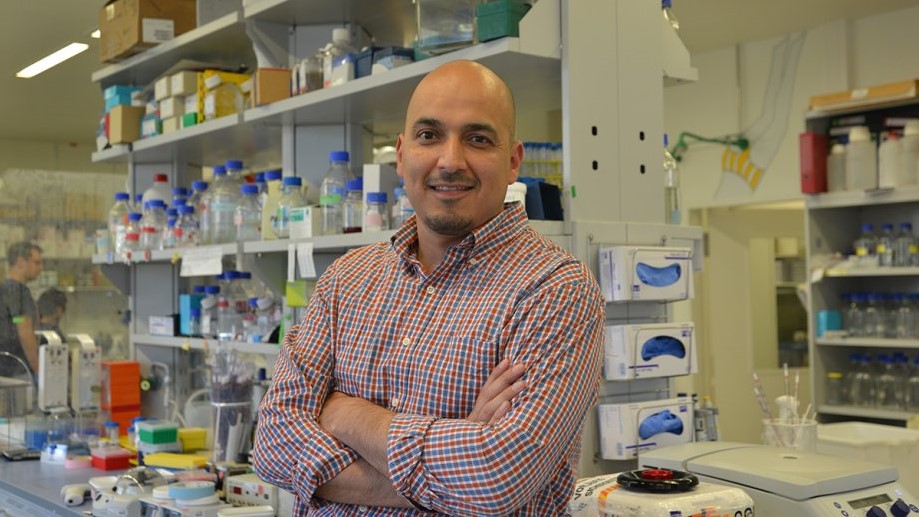SDSU Assistant Professor Awarded Prestigious NSF CAREER Grant

This piece by South Dakota State University was published May 26.
Jaime Lopez, an assistant professor in biology and microbiology at SDSU, has received a five-year, $950,000 National Science Foundation Early Career Development Award to further his DNA repair research. A unique aspect of the study will be the use of high school students in his research.
SDSU faculty member Jaime Lopez has received a National Science Foundation Early CAREER Development Award of nearly $1 million. The assistant professor in biology and microbiology hopes it will not only further his DNA repair research, but also motivate current high school students to pursue a career in science.
The $950,000 grant from the independent federal agency requires the recipient’s proposal to show how the work will have a broader impact.
Lopez, who has been at South Dakota State University since August 2017, plans to include high school students in his research — first by offering a one-day workshop to their teachers this summer and then having the teachers’ students conduct research using yeast cells, which share many of the same enzymes, proteins and processes as human cells, he said.
“I want to help teachers enrich their current curriculum so students enjoy their biology classes and might consider a STEM (science, technology, engineering, math) career,” Lopez said.
He plans to start small, offering the workshop to five teachers this summer. One workshop will be held each summer through 2026.
The grant runs May 1 through April 30, 2027, and is titled “Uncovering Mechanisms of DNA-protein Crosslink Repair.”
Understanding the mechanisms of DNA-protein crosslink repair
“DNA is constantly being damaged by sun, toxins in the air, pollutants and biological processes. Our cells have to be able to detect damaged DNA and repair it. Chemotherapy damages DNA beyond the cells’ ability to repair it. That’s why it is effective.
“Proteins interact with DNA. Some of these proteins on the DNA can get trapped, stuck like a glue. When proteins are stuck to DNA, it keeps the DNA from being completely replicated. It’s a big deal to get rid of these DNA-protein crosslinks,” Lopez said.
An excessive number of DNA-protein crosslinks result in cell death, he said. “Some chemotherapeutics function by inducing DNA-protein crosslinks.”
“Our body has an enzyme (Spartan) whose job is to remove DNA-protein crosslinks. DNA-protein crosslinks occur even without chemotherapy. Some cancers are very good at becoming resistant to chemotherapy. Particularly in breast and ovarian cancers, Spartan can overcome the DNA-protein crosslinks induced by the chemotherapy, negating the effect of the chemotherapy.
“In fact, a fraction of breast and ovarian cancers have double or triple the amount of Spartan as those seen in normal cells. If we can block Spartan in these cancer cells, we can lower the amount of chemotherapy needed and reduce side effects and the propensity for these cancers to become drug resistant.
“Therefore, we need to give a variety of (cancer-fighting) chemicals and at lower doses,” Lopez said.
In his research, he hopes to learn exactly how DNA-protein crosslinks are repaired, what genes are involved and how they cooperate to repair these lesions. In addition, he hopes to understand how cells can gain resistance to DNA-protein crosslinking agents.
High school students to identify resistant cells
In addition to working with breast cancer cells, he will use brewer’s yeast, a single-cell organism, in his research and that’s where the high school students come in.
Students will receive yeast cells that have had the DNA-protein crosslink repair enzymes removed. Students will grow the yeast on petri dishes with and without a DNA-protein crosslink-inducing chemical. Normal yeast cells will survive but the yeast cells missing two DNA-protein crosslinking repair enzymes will not.
Interestingly, among the population of yeast cells deficient in DNA-protein crosslink repair, there will be increased mutation rates and the students will observe that a small fraction of these cells will survive and be completely resistant to the DNA-protein crosslink-inducing chemical.
The surviving yeast cells will be shipped to the Lopez lab so he can sequence the DNA sequences of the surviving yeast cells to learn what made them resistant to the DNA-protein crosslinks that killed the normal cells. The students will learn the name of the genes that code for proteins and, together with Lopez, develop hypotheses to explain how mutations in such genes make cells resistant to DNA-protein crosslinks.
While Lopez has a lot of research experience and was named outstanding researcher for the College of Natural Sciences in 2022, he has never worked with high school students.
“Our goal is to track these students over their high school career and see if we are able to impact some of these students to choose a STEM career,” he said. Toward that end, Lopez has recruited Jennifer Kerkvliet from the College of Nursing’s Population Health Evaluation Center to survey student interest in a STEM career both before working with Lopez and afterward. Lopez’s training of high school students will be evaluated by Evren Celik-Wiltse and David Wiltse, faculty from the School of American and Global Studies.
Grant funds will cover stipends for these faculty as well as faculty from the Population Health Evaluation Center, salaries for two graduate research assistants, research supplies and expenses for the teacher training. Selected teachers will receive a $500 stipend as well as have food and lodging provided.
For more information on the training, email Lopez or call 605-688-4568.
⇒ The upcoming CAREER Award deadline is July 25, 2022 (fourth Monday in July). Learn more.
 National Science Foundation RII Track-1 Project:Expanding Research, Education and Innovation in South Dakota
National Science Foundation RII Track-1 Project:Expanding Research, Education and Innovation in South Dakota